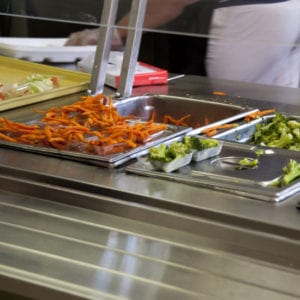Meet the Needs of Financially Insecure Students
43%
As the cost of higher education has risen in the United States, more students are experiencing increased financial stress while pursuing their degree. Multiple studies on higher education have linked financially insecure students to decreased academic performance and overall sense of well-being, so support of these students has increasingly fallen to student affairs as a crucial component of overall student success.
EAB’s research on Scaling Support for Financially Insecure Students has identified food insecurity and textbook costs as two major stressors for this student population. Review the following two-page overviews to better understand the impact of food insecurity and textbook costs on the student experience, as well as learn new strategies from other institutions on how to best address these concerns.
Food insecurity
Food insecurity is one of the most pressing concerns for financially insecure students and is increasingly common among undergraduate students. According to a Hope Center Survey in 2019, 41% of four-year students reported that they had experienced food insecurity in the past 30 days.
Common Resources
Campus Food Pantries: Food distribution centers on campus funded through community donations, student groups, and/or local food bank partnerships.
Meal Swipe Donations: Students donate unused meal swipes that staff distribute to students.
Mobile Food Pantries: Pop-up style pantries that bring food to campus and are typically only available monthly or weekly.
Satellite/Pocket Pantries: Mini food pantries, offering refrigerated meals or nonperishable snacks, are set up in high-traffic locations.
Rescued Food Alert Systems: Institutions send out texts, tweets, or use an app, to alert students about leftover food following campus events.
Single Stop: Nonprofit organization that partners with institutions to connect students to federal, local, and on-campus resources.
Enrolled students going hungry
41%
of four-year university students are food insecure
24%
of students cut the size of meals or skipped meals because there was not enough money for food
20%
of students experiencing food insecurity receive SNAP benefits
Innovative strategies to improve support for students experiencing food insecurity
Raise awareness of resources through peer advocacy
City University of New York increases student awareness of resources with their Food Security Advocates Program. Paid student advocates advertise food insecurity services through print and media campaigns and connect peers with federal and local benefits like SNAP.
Incorporate opportunities for feedback
American University conducts an anonymous survey emailed to users of the food pantry and uses the feedback to improve the pantry’s operations. The survey has a high participation rate of 85 percent, demonstrating student interest in improving the program.
Use multiple channels for food distribution
CSU developed Rams Against Hunger to provide emergency food relief to members of the Ram community experiencing food insecurity. The initiative encompasses multiple food insecurity services, giving students more flexibility around how they receive support. The program includes initiatives to reduce food waste, increase awareness of available support, and connect students with federal resources.

CSU launched Rams Against Hunger to combat food insecurity on campus
Current efforts to address food insecurity fail to reach all students in need. Social stigma, hard-to-find service locations, and strict eligibility requirements prevent students from accessing essential support. Colorado State University’s Rams Against Hunger initiative provides multiple avenues for accessing support, so students can choose the option that works best for them. Rams Against Hunger services include a mobile food pantry, meal swipe donations, pocket pantries, a food recovery program, and in person assistance with navigating federal aid eligibility. The multi-pronged approach ensures students have a variety of methods to receive food relief. The visibility of the different services also raises awareness of food insecurity on campus and decreases stigma by allowing community members of different levels of need to access the resources.
CSU’s multi-pronged strategy to combat student hunger
- The Ram Food Recovery program reduces food waste by allowing students to pick up leftover food from catered campus events.
- Community members sign up for free text alerts on their phone with details on where food is available.
- The program is free for all students, faculty, and staff. Individuals only need to bring a clean container and agree to the CSU Waiver and Food Safety guidelines to participate.
- Services like the food bank and pocket pantries are available to all staff, faculty, and students with a campus ID, making the programs easily accessible.
- Pocket pantries are strategically located in high traffic areas so students can easily access pantry items.
- CSU centralizes services information on the Rams Against Hunger webpage.
- The mobile food pantry is supported by a local food bank that delivers fresh produce, dairy products, and baked goods each month.
- CSU partners with the Larimer County Health District to provide on-campus advising to students on SNAP and other federal benefits.
- Pocket pantries are funded through a $50,000 donation from the student government.
Housing affordability
Growing numbers of students are struggling with housing insecurity—in fact, 64% of food insecure students also experience housing insecurity. Students can’t be expected to achieve academic success or personal wellness until their basic needs are met. Supporting housing security on campus should be a crucial priority for student affairs officers and other senior campus leaders.
Housing Insecurity vs Homelessness
Housing Insecurity
Student experienced any of the following in the last year:
• Had difficult paying or did not pay full cost of rent
• Had trouble paying or did not pay utility bills
• Moved in with others (temporarily or long-term) due to financial concerns
• Moved two or more times
• Borrowed money to help pay bills
Homelessness
Student experienced any of the following in the last year:
• Lived in a shelter
• Did not have a place to sleep for even one night
• Evicted from residence
• Thrown out of residence from family member, relative, or roommate
• Stayed in a shelter
• Stayed in any place not meant for regular housing, even for one night

Students face housing barriers to academic success
46%
of students from two and four-year institutions experienced housing insecurity in 2018
17%
of students from two and four-year institutions experienced homelessness in 2018
1.5M
K-12 students experienced homelessness in the last three school years, a 15% increase since 2015-2016
Innovative strategies to address housing insecurity
Negotiate free nights for students with local hotels
University of Fraser Valley uses a hotel near campus for athletics-related bookings. As an incentive, the hotel gives the university free nights to use at their discretion. The university uses those nights to provide temporary emergency housing to students while they secure a longer-term housing option.
Pair emergency housing with staff support
Kennesaw State University’s Campus Awareness, Resource, & Empowerment (CARE) Services pairs housing insecure students with on-campus emergency housing rooms. CARE also provides one-on-one advising to help the same students find permanent housing.
Form partnerships to provide low or no-cost housing
University of Washington-Tacoma partners with its local housing authority and a private developer to provide housing-insecure students with a place to stay during the school year. The partnership provides UW-Tacoma with 52 different units for students experiencing homelessness.
UW-Tacoma forms powerful community partnerships to help students
Student housing insecurity, often complicated by local housing markets, policies, and politics, is a challenging issue for higher education leaders to address. University of Washington-Tacoma (UWT) navigated this challenge by working with Tacoma’s local housing authority and a private developer, Kōz Development, to subsidize rent on individual units through funds set aside for income-qualified homeless and housing insecure students. Eligible students sign an annual lease than can be renewed up to three times as long as the student achieves a 2.0 GPA and at least six credits. The program also accounts for unexpected challenges and allows students to take one term off due to hardship and renew the lease one year past graduation. In 2020, 91 students were receiving housing via UWT’s college housing assistance program, demonstrating its reach among students in need.
Successfully fund and connect students with housing assistance
- In addition to its partnership with a local developer and housing authority, UW Tacoma partners with community members to provide students with housing through the program Husky2Husky.
- Husky2Husky is a homesharing program that matches students with Tacoma residents willing to provide a spare room in their house in exchange for help with household tasks and/or financial exchange.
- UW-Tacoma spotlights its housing program with community members, staff, and local officials through community events in order to encourage continued support for the program.
- Faculty include information about campus resources in their syllabuses, ensuring students who may not otherwise know about programs are aware of available services.
- The office of student affairs serves as a one-stop shop where students can connect to additional services like emergency funding, the counseling center, and food insecurity resources.
- The office also has an in-house social worker who connects students demonstrating housing insecurity with the appropriate program.
- Faculty members can also refer students to the student affairs’ office, assisting students who may not visit the office on their own accord.

Textbook affordability
When students try to prepare for the financial burden of pursuing an undergraduate degree, the cost of coursework materials can often take them by surprise. Requiring expensive textbooks for a specific course can negatively impact a student’s academic performance when they choose not to purchase required materials or even skip meals to try to afford required course materials.
Media scrutiny of exorbitant textbook prices and opposition from students have made the costs of course materials a growing concern for institutions. However, faculty have the most control over course materials, but don’t always have the awareness or motivation to provide affordable alternatives.
Affordable Alternatives
Open Educational Resources (OER): Openly licensed digital resources available for free online
Open Access Textbooks: Free textbooks, available online
Ebooks/ Digital Textbooks: Growing more popular among publishers because Gen Z is comfortable navigating digital materials, digital textbooks can be up to 60% cheaper than hardbacks
Inclusive Access Programs: Course materials are included in the overall course cost; students automatically receive access to digital course materials at a discounted rate
Rental Textbooks: Used textbooks that students can rent for one semester at a fraction of the price of ownership
Textbook costs pose a financial hurdle
43%
of current and former university students say they’ve skipped meals to save money to afford course materials
85%
of current and former students say their textbook and course material expenses are financially stressful
$415
average amount students spent on course materials in the 2018-2019 academic year
Three ways to increase textbook affordability
Include textbook prices in course descriptions
UMass Lowell highlights courses as no- or low-cost in the student registration system if required course materials cost less than $40, incentivizing professors to adopt cheaper materials.
Leverage vendor partnerships to reduce prices
New York University put affordability first in its partnership with Follett, a retail college bookseller, forgoing commission and requiring Follett to adopt less than a 10 percent commission on new textbook sales.
Build awareness of low-cost textbook alternatives
USF’s Textbook Affordability Project builds support for its initiatives through targeted recommendations and reports that hold faculty accountable for the cost of course materials.
USF lowers textbook costs through education and transparency
The University of South Florida’s Textbook Affordability Project (TAP) aims to tackle this problem head-on with its easy-to-navigate website on textbook affordability. The website educates faculty about textbook affordability, recommends ways to reduce cost, and highlights affordable alternatives. The site also compares the cost per credit hour of different academic departments, challenging faculty to offer more affordable materials. TAP has saved students over 24 million dollars since its launch in 2010.
TAP’s three key strategies to lower textbook costs
- Average textbook costs for each department are posted online to motivate faculty to choose cheaper course materials.
- The digital “Faculty Toolbox” provides best practices, report cards, and a guide on how to adopt more affordable materials.
- TAP recommends faculty do not require coursework that costs students more than $20 per credit hour
- TAP staff review faculty’s bookstore orders from the previous semester and recommend cheaper course materials.
- Open-access textbook providers deliver presentations to faculty and staff on affordable alternatives.
- TAP’s website provides a glossary of key textbook affordability terms.
- Faculty receive a “report card” on the cost of their required course materials that is reviewed by university administrators to evaluate departments’ progress in lowering costs.
- New general education course proposals must include information on the overall cost of required course materials.
- USF libraries provide institutional leadership with an annual report on money saved through TAP initiatives.
Scale support for financially insecure students
Ease the burden of help-seeking on students through centralized resources with strategies in this study.
This resource requires EAB partnership access to view.
Access the research report
Learn how you can get access to this resource as well as hands-on support from our experts through Strategic Advisory Services.
Learn More